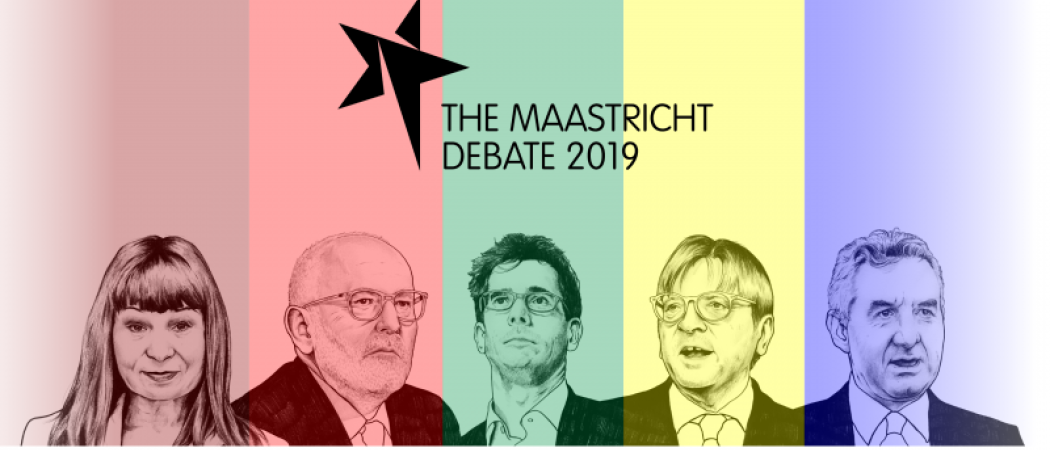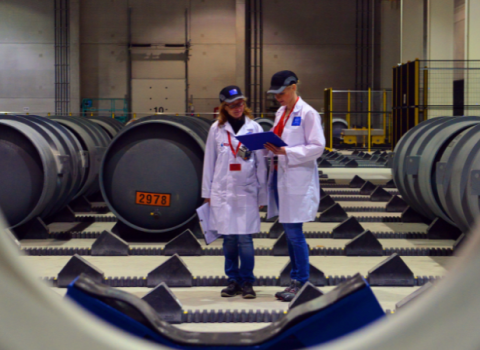Five candidate make their case to be the next European Commission president

Image: The European Youth Forum
Pledges to tackle climate change and reign in the power of the big US technology companies dominated at a debate on Monday night between hopefuls for the EU top job.
Five candidates vying to replace Jean-Claude Juncker, who has held the Commission presidency for the past five years, breezily engaged each other for 90 minutes in Maastricht, calling for bolder action on climate change and a bullish response to the dominance of US tech companies.
The apparent, if not surprising, takeaway from the rapid-fire encounter was the amount of common ground between the rivals on stage. The exception was probably Czech Republic’s Jan Zahradil, for the Alliance of Conservatives and Reformists in Europe, who repeatedly called for the EU’s responsibilities to be limited.
He and the other “Spitzenkandidaten”, the lead candidates nominated by each major party grouping in the European Parliament as their preferred successor to Juncker, tried to persuade citizens to look past narrow domestic politics and cast their votes based on the appeal of pan-European candidates.
Absent from the stage was Germany’s Manfred Weber, leader of the conservative European Peoples’ Party, the biggest voting bloc in the European Parliament, and front-runner to succeed Juncker. Weber instead chose to attend a party in Bavaria, declining an invitation to the Maastricht debate sent last year.
The five candidates took full advantage of Weber’s absence, with Belgium’s Guy Verhofstadt, the Parliament’s liberal group leader, calling for a “more offensive” EU stance on climate change.
“We need to set environmental standards in our trade negotiations. We need investment into new batteries and [environmentally friendly] meat,” he said.
The European Green Party’s Bas Eickhout rounded on Verhofstadt, saying, “If he is serious about this, he’ll make sure trade negotiations with the US don’t happen,” a reference to president Donald Trump pulling out of the UN Paris climate accord in 2017, weakening the huge international effort to combat global warming.
New jobs will flow from tougher EU green standards, Eickhout said. Without “credible green policies we will all be importing cars from Japan.” Currently, the EU lets major polluters off too easily and "prices for carbon are way too low."
Stop the house from falling apart
Socialist candidate Frans Timmermans, meanwhile, pointed to his role in developing the EU’s strategy to ban single-use plastics, which he predicted is “going to be copied by everyone”.
“There’s a man in Washington who is trying to break all this,” said Timmermans, former Dutch foreign minister who is Commission first vice president. “Only a united Europe can stop Trump and his idiocy.”
In a snap poll after the debate, 42 per cent said Timmermans performed best, followed by Eickhout with 35 per cent and Verhofstadt with 11 per cent.
Violeta Tomić for the Party of the European Left, lowest-rated debater with 5 per cent, said her far-left group is proposing the green New Deal for Europe, a plan to tackle climate change similar to the one introduced by Congresswoman Alexandria Ocasio-Cortez in the US.
“Our house is falling apart,” she said. “We have to act very, very quickly. We don’t believe it is possible to have environmental turn-around with neoliberal policies; we have to invest in green new jobs.”
Zahradil is against greater EU involvement in climate change policies. “Look at what happened in France, with a small tax on fuel,” he said, noting the tax sparked the furious and sustained response of the gilets jaunes protesters.
“We have to choose the right timetable,” Zahradil said. “We also have to act realistically. We have to phase out coal burning in a sustainable way. Some countries are not ready.”
Far from proposing new laws, the EU should limit itself to investing in green tech through its next research programme, Horizon Europe, and the Commission’s largescale investment vehicle, InvestEU, he added.
Whether any of these candidates will be in the minds of voters in the May election is anyone’s guess, but the evidence is that voters tend to think about national issues rather than EU policies when they go to the polls.
Projections suggest the election will return a highly fragmented Parliament, with populist, Eurosceptic candidates in line to gain control of up to a third of all seats.
EU law requires governments to weigh these election results when choosing a new Commission president but it does not require them to select anyone currently in the race.
Some believe EU governments could ultimately select one of their own rather than any of the candidates running in the campaign.
Still in the frame for the job is the EU's chief Brexit negotiator, Michel Barnier, considered by many as an amenable alternative, over whom member states could compromise. Barnier was delivering a speech at the Catholic University of Leuven on Monday night while the candidates debated in Maastricht.
Tech companies in firing line
Google, Amazon and Facebook were repeatedly in the firing line, as candidates lined up to accuse them of abusing privacy, squeezing competition, casually spreading hate and not paying enough in taxes.
The candidates were as one in fretting about the size of US tech platforms, pledging regulation to check their power.
Member states, “are getting arm-twisted by large companies and they can’t take them on individually anymore,” said Timmermans. “These tech companies use the data you give them for free and make billions off it. This data needs to be owned by you and they need to pay more in tax.”
Questioned as to why he couldn’t use his own influential position within the Commission to pursue these proposals, Timmermans shifted the blame to member states, which he characterised as frequent thwarters of EU action.
“The best way to tackle Facebook is to have a European Facebook,” said Verhofstadt, a former prime minister of Belgium, holding up a chart to demonstrate just how few big tech companies Europe has compared with China and the US. However, he did not have a prescription for how the EU would create a Facebook rival, while Timmermans dismissed the proposal as “protectionist”.
Verhofstadt also said Brussels must resist efforts by American companies to influence EU rules. “It’s not for [Facebook CEO] Mark Zuckerberg to tell us what’s right and wrong,” he said.
There are growing efforts in Brussels to do something about big tech. In the last five years record fines have been handed out by the EU competition commissioner to internet giants Apple and Google, which have been variously judged to have abused their dominant positions.
There is also the widespread belief that social networks like Facebook and Youtube played a decisive (and damaging) role in the UK Brexit referendum and US presidential election in 2016.
Verhofstadt said he has complained to former UK deputy prime minister Nick Clegg, recently appointed Facebook’s head of global affairs, about advertising restrictions for the European election.
For Zahradil, there should be “no upper limit, or no lower limit” on taxing internet companies. “I don’t think [deciding] taxation should be the role of the EU. It should not turn into a state,” he said.
Tomić blamed Brussels for putting “the interests of banks and corporations ahead of people.” The financial crisis is “a distant memory” for “bankers and stockbrokers in Frankfurt and London” but not for ordinary Europeans, she said.
Her proposal was for a higher tax on Google, Amazon and the other big tech companies. “We have to abolish all tax havens for corporations”
Tomić also called for the EU to develop a “fake news scale.” The case of Cambridge Analytica, the company which harvested private information from Facebook profiles to identify the personalities of voters and influence their behaviour, “shows us that data is a weapon in politics today,” she said.
Cambridge Analytica is facing intertwined investigations by regulators in the UK and US into allegations that it performed illegal work during the Brexit referendum and Trump’s presidential campaign in 2016.





 A unique international forum for public research organisations and companies to connect their external engagement with strategic interests around their R&D system.
A unique international forum for public research organisations and companies to connect their external engagement with strategic interests around their R&D system.